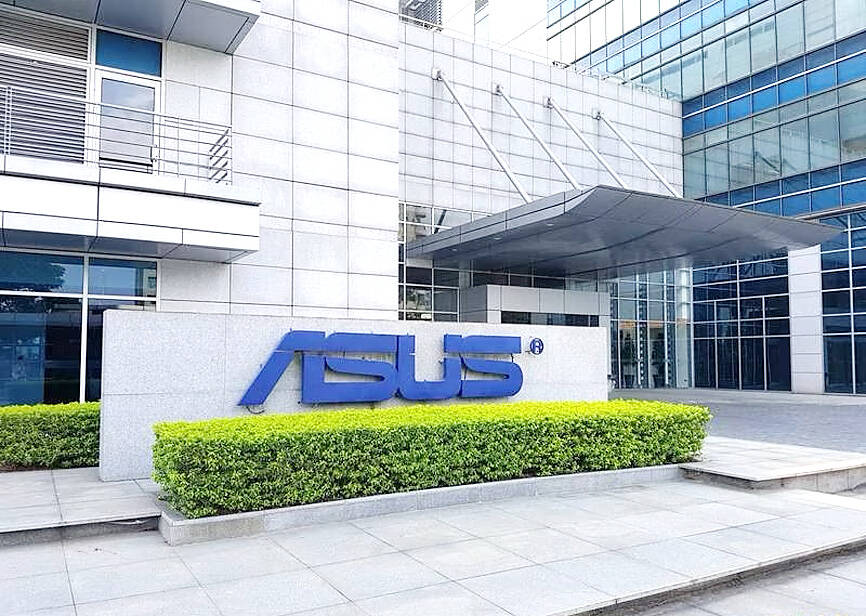PC vendor Asustek Computer Inc (華碩電腦) yesterday said PC revenue this quarter would dip about 15 percent sequentially due to weak seasonal demand in Asia and the US, while downgrading the growth in the global PC market next year to a low to mid-single digit percentage, from its earlier estimate of a high-single-digit percentage expansion made in August.
“The Gaza conflicts pose new uncertainty, though the tension seems not to escalate for now,” Asustek co-chief executive officer Samson Hu (胡書賓) told investors yesterday. “Besides, the inflation in the US and Europe probably will not mitigate until the second half of 2024.”
The good news is that Microsoft Corp’s new Windows operating system and Intel Corp’s latest artificial intelligence (AI) PC solutions might help fuel replacement demand next year, Hu said.

Photo: Fang Wei-chieh, Taipei Times
In addition, Chromebook replacement demand is likely to emerge after consumers bought the the computers four years ago during the COVID-19 pandemic, he said.
Asustek has secured sizable server orders in Vietnam, India and Singapore in close collaboration with AI chip supplier Nvidia Corp, Asustek co-CEO S.Y. Hsu (許先越) said.
Last quarter, server revenue jumped 40 percent from a year earlier, Hu said, adding that the company is on track to achieve its five-year goal of growing server revenue by five times starting this year.
Half of the company’s servers are to have AI capabilities next year, Hsu said.
AI-enabled servers are expected to make up a low-single-digit percentage of the company’s total revenue this year, he said. The new business’s revenue contribution is expected to climb to a mid-single-digit percentage next year and to a double-digit percent in 2025, he added.
Asustek expects revenue from the electronic component business to increase 5 percent sequentially this quarter. Components such as motherboards accounted for 32 percent of total revenue last quarter, while PCs made up 67 percent.
Net profit last quarter more than quadrupled to NT$11.1 billion (US$343.3 million), the highest in seven years compared with NT$2.59 billion in the second quarter. On an annual basis, net profit soared 79 percent from NT$6.19 billion. Earnings per share skyrocketed to NT$14.9 last quarter from NT$3.5 a quarter ago and NT$8.3 a year earlier.
Last quarter, gross margin improved to 17.4 percent, the strongest performance in six quarters, compared with 12.5 percent in the second quarter and 11.6 percent a year ago, while the operating margin rose to 6.7 percent from 1.1 percent a quarter earlier and 2.3 percent a year ago.
Given last quarter’s financial results, Asustek said it is confident it could achieve a 4 to 5 percent operating margin in the long term.
The firm also said its inventories had returned to a healthy level of NT$120 billion last quarter, with the overall PC industry moving in an upward direction.
“AI PCs will be an important factor driving a new upcycle for the PC industry for multiple years to come,” Asustek chief financial officer Nick Wu (吳長榮) said yesterday.

Nvidia Corp CEO Jensen Huang (黃仁勳) is expected to miss the inauguration of US president-elect Donald Trump on Monday, bucking a trend among high-profile US technology leaders. Huang is visiting East Asia this week, as he typically does around the time of the Lunar New Year, a person familiar with the situation said. He has never previously attended a US presidential inauguration, said the person, who asked not to be identified, because the plans have not been announced. That makes Nvidia an exception among the most valuable technology companies, most of which are sending cofounders or CEOs to the event. That includes

TARIFF TRADE-OFF: Machinery exports to China dropped after Beijing ended its tariff reductions in June, while potential new tariffs fueled ‘front-loaded’ orders to the US The nation’s machinery exports to the US amounted to US$7.19 billion last year, surpassing the US$6.86 billion to China to become the largest export destination for the local machinery industry, the Taiwan Association of Machinery Industry (TAMI, 台灣機械公會) said in a report on Jan. 10. It came as some manufacturers brought forward or “front-loaded” US-bound shipments as required by customers ahead of potential tariffs imposed by the new US administration, the association said. During his campaign, US president-elect Donald Trump threatened tariffs of as high as 60 percent on Chinese goods and 10 percent to 20 percent on imports from other countries.

Taiwanese manufacturers have a chance to play a key role in the humanoid robot supply chain, Tongtai Machine and Tool Co (東台精機) chairman Yen Jui-hsiung (嚴瑞雄) said yesterday. That is because Taiwanese companies are capable of making key parts needed for humanoid robots to move, such as harmonic drives and planetary gearboxes, Yen said. This ability to produce these key elements could help Taiwanese manufacturers “become part of the US supply chain,” he added. Yen made the remarks a day after Nvidia Corp cofounder and chief executive officer Jensen Huang (黃仁勳) said his company and Taiwan Semiconductor Manufacturing Co (TSMC, 台積電) are jointly

MARKET SHIFTS: Exports to the US soared more than 120 percent to almost one quarter, while ASEAN has steadily increased to 18.5 percent on rising tech sales The proportion of Taiwan’s exports directed to China, including Hong Kong, declined by more than 12 percentage points last year compared with its peak in 2020, the Ministry of Finance said on Thursday last week. The decrease reflects the ongoing restructuring of global supply chains, driven by escalating trade tensions between Beijing and Washington. Data compiled by the ministry showed China and Hong Kong accounted for 31.7 percent of Taiwan’s total outbound sales last year, a drop of 12.2 percentage points from a high of 43.9 percent in 2020. In addition to increasing trade conflicts between China and the US, the ministry said